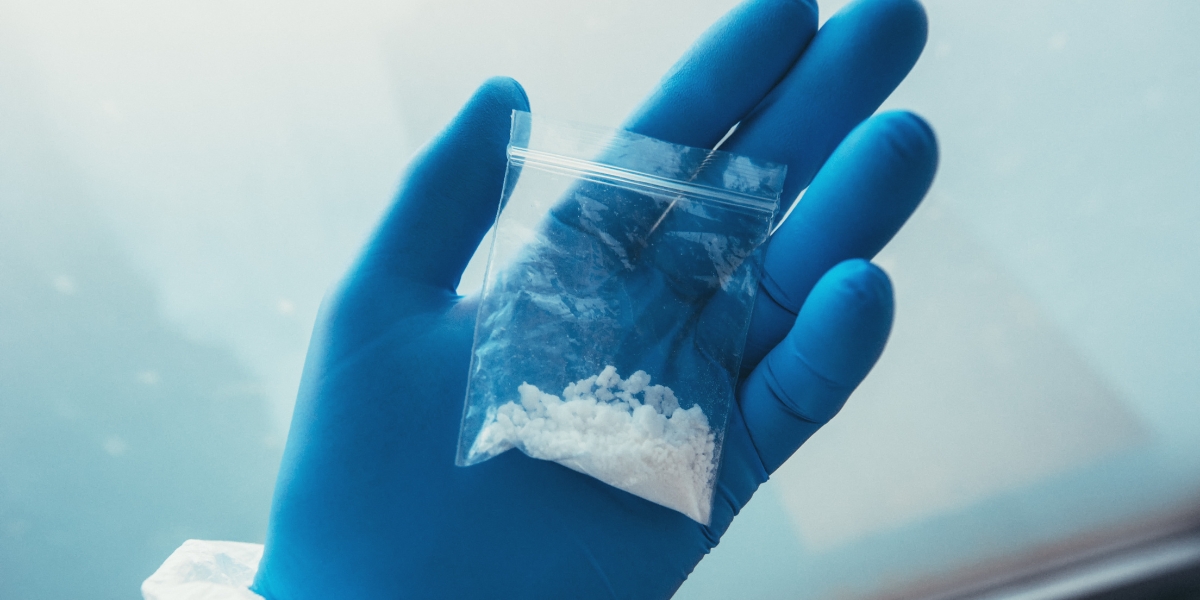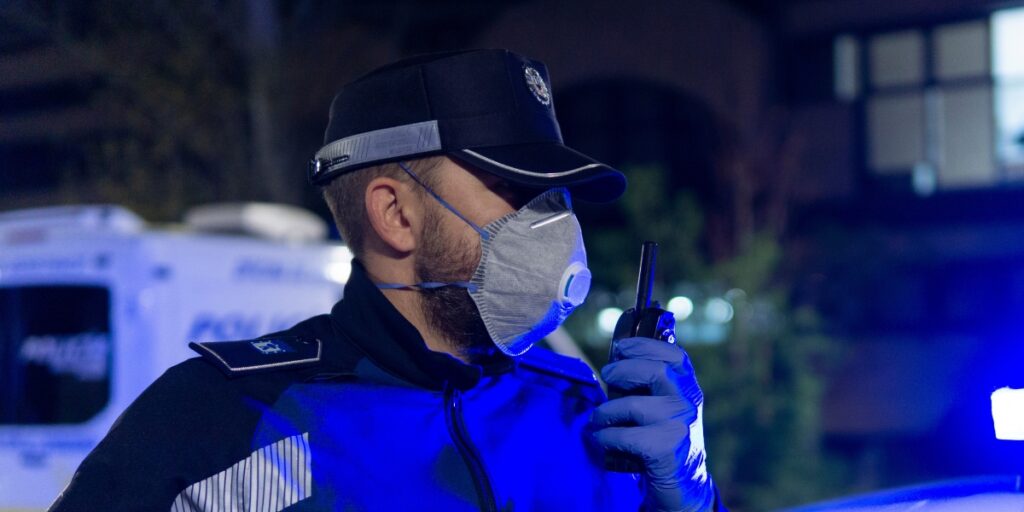Can You Die From Touching Fentanyl?

As more people become aware of the opioid and overdose crisis in the United States, there is one recurring question; can you die from touching fentanyl? Undoubtedly, fentanyl is a dangerous drug, but you cannot die simply from touching it.
Being cautious about drugs and handling them with care is essential, but knowing the facts from fiction is vital in addressing addiction and removing harmful stigmas, especially around opioid exposure and treating overdoses.
In 2021, the San Diego County Sherriff Department released footage from a police officer’s body camera showing another officer overdosing after exposure to fentanyl. According to police officers’ statements, they were processing drugs that did test positive for fentanyl at a crime scene when the deputy lost consciousness and stopped breathing. After several doses of the life-saving drug Narcan and emergency medical treatment, the officer fully recovered.
You can see the dramatic footage in the news clip below.
Copyright: FOX Television Stations
Source: https://www.foxla.com/video/963816/
The footage from the body camera quickly went viral. It sparked discussions on how dangerous fentanyl is and whether you can overdose or die just from touching or accidentally inhaling fentanyl.
Misinformation surrounding fentanyl and opioid exposure stems from a lack of understanding of how drugs work. In an overabundance of protecting police officers and public safety workers who come in contact with fentanyl, information is repeated and spread quickly, often before experts can weigh in. It is certainly never a bad thing to take safety precautions; however, experts worry that the misinformation leads to fear surrounding fentanyl users and could delay life-saving response times.
What Is Fentanyl?
Fentanyl is a highly potent synthetic opioid painkiller. Fentanyl works similarly to morphine but is 50 to 100 times more powerful. As a central nervous system depressant, fentanyl binds to the brain’s opioid receptors to reduce or stop pain signals from reaching the brain.
Fentanyl forms include liquid, patches, oral tablets, or lozenges, similar to cough drops. Doctors prescribe fentanyl to patients with chronic or severe pain, especially those who have become tolerant to other opioid medications. Currently, fentanyl is the most widely used opiate in medical settings.
On the streets, fentanyl is typically trafficked and sold as a loose powder making it easy to combine with other drugs or press into a pill form. Liquid fentanyl is sometimes used as a nasal spray or dripped onto candy or small pieces of tissue or paper to eat. Dealers often use fentanyl to cut other drugs like heroin and counterfeit pain pills because it is cheap and gives an intense high.
While some users actively seek out fentanyl, most people are unaware it is mixed in with their drugs, leading to accidental overdose deaths. Fentanyl overdoses are now more common than prescription opioid overdoses, and many experts believe the numbers could be higher but are hard to gauge because of a lack of testing.
On its own, fentanyl is lethal even in small doses; mixing it with other drugs with the same effect increases the lethality. Famously, rapper Mac Miller died from an overdose when he unknowingly took pills cut with fentanyl. Medical toxicologists determined that Miller would not have died from an overdose without fentanyl mixed into the drugs. The men who provided the drugs to Mac Miller are currently facing over a decade in prison for their involvement.
Can You Die From Touching Fentanyl?
You cannot die from touching fentanyl. Fentanyl has to enter the bloodstream to be effective; skin contact does not allow it to get into the body in any way that could lead to opioid toxicity or death.
But what about fentanyl patches? Fentanyl patches, also called transdermal patches, are specially designed for consistent doses of pain relief. With patches, fentanyl can be absorbed through the skin to build up in the tissue underneath and slowly released into the bloodstream. It takes 24 to 72 hours for a fentanyl patch to be effective. Brief contact with a fentanyl patch cannot kill you and is unlikely to result in any effects, especially an opioid overdose or death.
Public safety workers, law enforcement officials, and emergency responders have specific safety guidelines and procedures to follow when they risk contact with the drug itself. However, there is always a risk of accidental exposure to fentanyl in unpredictable situations, especially if someone is unprepared.

Can You Overdose From Touching Fentanyl?
Touching fentanyl cannot lead to an overdose. Even though small amounts of fentanyl can be dangerous, it must enter the bloodstream to be effective.
The American College of Medical Toxicology (ACMT), the Center for Disease Control (CDC), and the American Academy of Clinical Toxicology (AACT) have all declared it medically impossible to overdose from skin contact with fentanyl. Harm reduction activist Chad Sabora has posted multiple videos of himself holding fentanyl to help dispel the myth that touching it can lead to an overdose.
If someone were to touch fentanyl and then accidentally touch their nose or mouth, there is a chance it will enter their system. Accidentally inhaling fentanyl is much more dangerous than skin contact with the drug. Inhaling fentanyl or ingesting it allows it into the bloodstream through mucus membranes.
Even fentanyl patches handling fentanyl patches will not result in a fentanyl overdose. The patches release minimal amounts of fentanyl very slowly; it would take prolonged skin contact with multiple patches to cause harm.
If you believe someone is experiencing a fentanyl overdose, it is always better to be safe and take steps to treat it. Narcan (Naloxone) is a life-saving opioid reversal medication that can stop an overdose until medical help arrives. Some overdoses require several doses of Narcan. People who are not experiencing an opioid overdose don’t experience any harmful side effects from receiving Narcan.
Why Is Fentanyl So Dangerous?
Fentanyl is so dangerous because even small amounts are highly potent, and it is very addictive. Fentanyl is 50 to 100 times stronger than morphine and 100 times stronger than heroin. Fentanyl’s popularity among dealers for cutting drugs makes it more prevalent on the illegal market.
People who unknowingly take fentanyl, thinking it is a drug they are used to and have developed a tolerance to, are much more likely to suffer an overdose.
Furthermore, combining fentanyl with other drugs increases its opioid toxicity and lethal potential. Fentanyl is fast-acting, which means that from the time a person ingests it to experiencing an overdose can happen within minutes.
How Much Fentanyl Can Kill You?
According to the Drug Enforcement Agency (DEA), 2 to 3 milligrams of fentanyl will kill the average adult. That’s comparable to several grains of salt.
People who are addicted to other opioids or fentanyl build a tolerance that allows them to handle more significant amounts, but even a tiny miscalculation can lead to an overdose.
Illegal chemists aren’t known for their precision when mixing drugs, which means every time someone uses, it’s a gamble on how much fentanyl might be present. The DEA reports that 2 out of 5 seized pills tested by their labs had at least 2mg of fentanyl. Measuring the amount of fentanyl mixed with loose heroin and cocaine is more challenging, but based on increasing overdose rates and deaths, it is clear that fentanyl continues to spread through drug supplies.
Is Fentanyl Addictive?
Fentanyl is very addictive. Fentanyl produces a quick high that results in intense euphoria and relaxation. On top of the psychological effects, the body becomes dependent on fentanyl rather quickly and requires repeated and higher doses to feel the effects.
Like other opioids, heroin, morphine, and oxycodone, fentanyl causes uncomfortable and dangerous withdrawal symptoms or “dope sickness” when people abruptly stop taking it. Frequently people who want to quit fentanyl use it to avoid going through withdrawal, perpetuating the cycle of addiction.

Fentanyl Treatment in Northridge, California
Another life is possible if you or a loved one is struggling with fentanyl or opioid addiction and fear of overdosing.
Northridge Addiction Treatment Center is in the heart of Los Angeles’s San Fernando Valley and offers a safe, calm, and private environment to start your life in recovery.
Our residential treatment center offers onsite medical detox with 24-hour medical attention and support to get you comfortably through withdrawal, followed by an evidence-based treatment plan tailored to your specific needs and goals.
Reach out to us today to take the first steps on your path to life-long recovery.
Find Meaningful Recovery
Our caring and compassionate specialists are eager to help you comfortably navigate this journey to recovery. Our individualized treatment plan, programs, and therapies may be a perfect match for you or your loved one. Let us assist you in living the happy life you deserve. It starts with a phone call.



